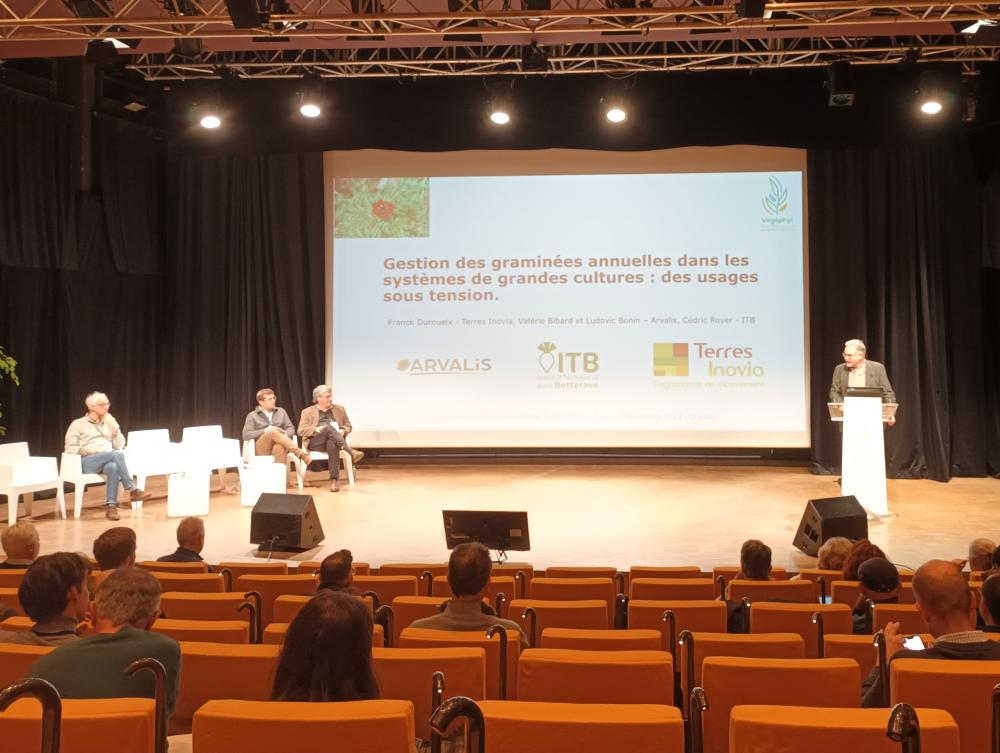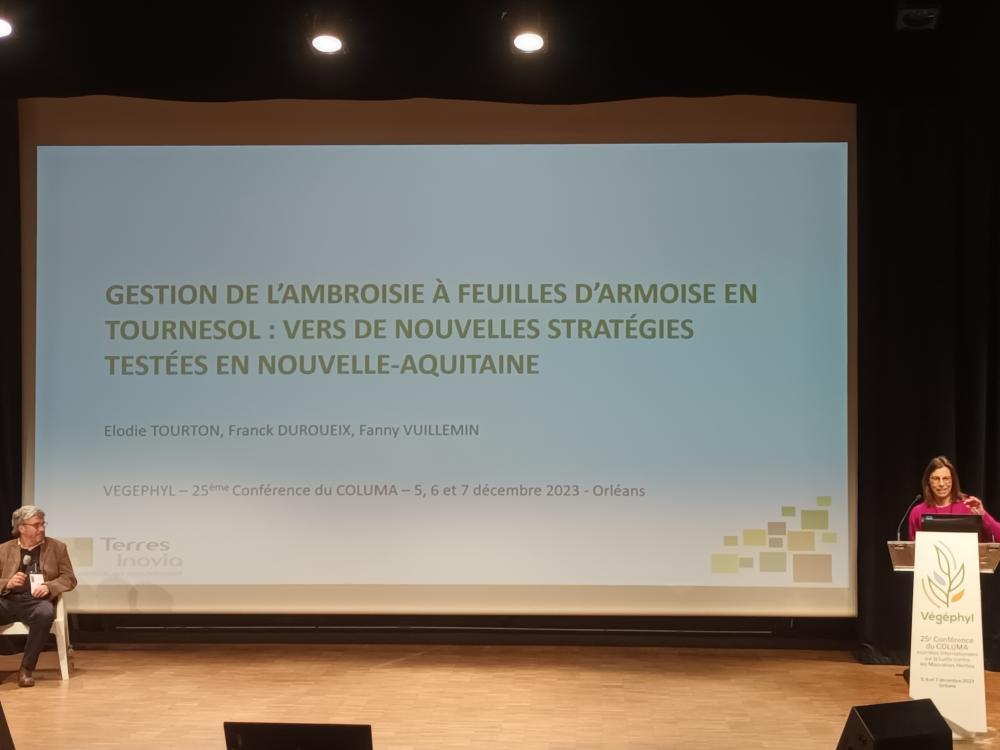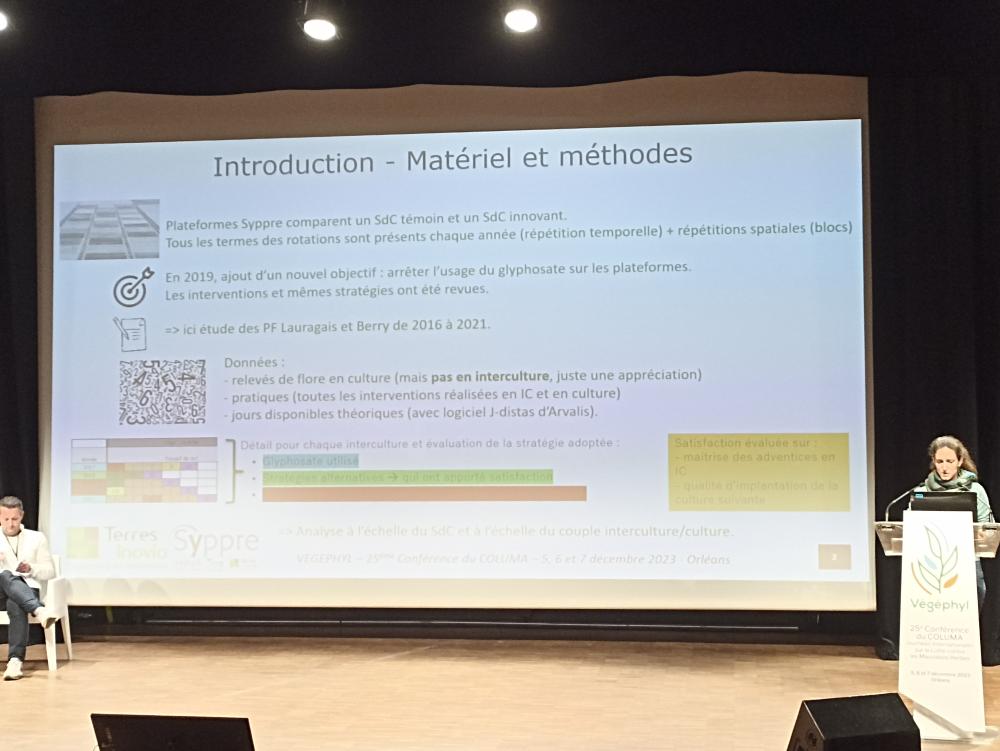Columa: a conference dedicated to weed control
Columa: a conference dedicated to weed control
The 25th French-speaking conference on weed control was held in Orléans from 5 to 7 December. Organised by Végéphyl, the event, commonly known as Columa, brought together 250 participants from a wide range of backgrounds: technical institutes including Terres Inovia, Inrae, phytosanitary firms, cooperatives, chambers of agriculture, Fredon, ARS, the French Academy of Agriculture, agricultural education and even engineering students.
The Columa summit covered a range of topics, including the harmfulness of weeds and how they are perceived by farmers, weed biology, weed management levers, cropping systems, herbicide resistance, the behaviour of herbicides in different environments, precision farming and robotics, weed monitoring and management tools and support, alternatives to glyphosate and changes in herbicides.
A round-table discussion moderated by Jean-Paul Hébrard, host of the PowerBoost programme on TvAgri, featured contributions from 8 professionals on the subject of "Weeds that can pose a risk to consumers and the general public", focusing on toxic or allergenic weeds such as datura and ragweed.
Terres Inovia was part of the organising committee. Franck Duroueix co-hosted the session on weed resistance to herbicides with Jacques Gasquez from the Académie d'agriculture de France; Fanny Vuillemin co-hosted the session on new weed control technologies with Emmanuel Leduc from FMC.
The Institute at the forefront
Terres Inovia also presented results through 3 oral communications:
- Franck Duroueix, strategic expert responsible for input evaluation, gave an overview of the management of annual grasses in field crops, where pressure is increasing, combined with resistance phenomena and the need to manage them in the context of the withdrawal of certain active ingredients, making it essential to implement integrated pest management levers and having a significant impact on production and the viability of certain sectors.

- Elodie Tourton, development engineer for the Vendée/Poitou-Charentes/Limousin region, has provided regional feedback on a multi-partner project (Terres Inovia, Chambre d'agriculture de la Charente, Océalia and Néolis) aimed at testing different herbicide programmes on mugwort ragweed in sunflowers in several trials in New Aquitaine. Among the solutions, the new halauxifen-methyl-based Viballa, which can be used on all sunflower varieties, was more effective than existing solutions and diversifies the active ingredients used on mugwort.

- Fanny Vuillemin, in charge of studies on integrated weed management, presented the results obtained on Syppre cropping systems (an inter-institute project involving Arvalis, ITB, Terres Inovia) in the Lauragais and Berry regions concerning the cessation of glyphosate on these two platforms from 2019, showing that in clay soils with heavy grass infestation it is difficult to successfully pursue all the objectives at once (cessation of glyphosate, reduction in tillage and herbicides in cultivation, productivity and profitability). And here's more here.

Among the wealth of scientific and technical information shared, the Columa's rich programme included the following points: that certain deadlock situations persist in the absence of glyphosate, including in conservation farming systems; that datura alkaloids can be found in batches of maize even in the absence of weed seeds, due to dust and impurities, that the presence of weeds is not necessarily indicative of the environment in which they are found, that shoots from fragments of creeping thistle roots or larger quackgrass rhizomes grow faster and reach greater lengths, that in winter cereals relay sowing can help to control weeds without impacting on yield, that the right methodology must be used to assess the harmfulness of weeds, that detecting non-target resistance by PCR is a long and tricky process, and that a robust oilseed rape with a high level of soil cover in the autumn presents a lower risk of herbicides being transferred by run-off, that the peak of the molecules on offer was in the 1990s and 2000s, but since then successive withdrawals have reduced the diversity of solutions, that isoflex (bixlozone) is effective on a wide range of grasses and broadleaf weeds as a pre-emergence treatment for oilseed rape, cereals and maize, that Telespazio's Geoadventice service makes it possible to identify datura precisely and to give a clearer picture of the target species, and that the use of isoflex (bixlozone) is also effective on a wide range of grasses and broadleaf weeds as a pre-emergence treatment for oilseed rape, cereals and maize.
Contact et crédit photos : F. Vuillemin, f.vuillemin@terresinovia.fr